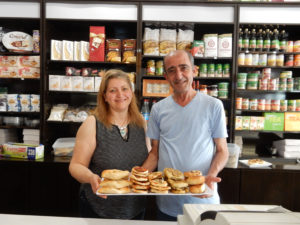Welcome to Carlton: Syrian family the latest chapter in an enduring migrant story
Akram Abouhamdan and his wife Joumana have just opened the first Syrian food shop on Lygon Street, in the historic Melbourne suburb of Carlton.
The shop – which sells Syrian sweets and dips, baklava and hand-made pasta – is quietly symbolic. Nestled among the Italian eateries along the famous strip, it represents the latest wave of migration to arrive in Melbourne.
It also represents the hopes and dreams of a refugee family who have had flee their home, their lives and everything they once held dear in their homeland Syria.
But Akram and Joumana’s story is slightly different from most people fleeing the five-year-long conflict in Syria.
They did not flee because their home was destroyed or because of fighting in their neighbourhood. They left because they were persecuted and threatened for supporting others left helpless by the war.
A successful businessman and a lawyer by training, Akram ran a successful food distribution business in southern city of As-Suwayda, which has remained relatively untouched by the brutal conflict that has engulfed much of the rest of the country.
And even as a members of the minority Druze faith, he and his family had no particular argument with the government of Syria or its president Bashar al-Assad.
That all changed for the Abouhamdans when refugees from other parts of Syria started flooding into their city.
“There were so many people who had fled the fighting and had literally nothing, we had to do something to help them,” Akram said.
Akram, with the help of two brothers working overseas as well as other family and friends, set up reception centre to house and feed woman and children who had fled the brutal conflict elsewhere in Syria.
“When the uprising began and fighting started in 2012 refugees began to come to our city,” Akram said.
“We made a place where they could stay and be safe and we provided food and blankets. We were accommodating 2,500 people,” he said.
But because most of the people being sheltered by the Abouhamdans came from areas where militia groups were opposing the Assad regime, the government considered them the wives and children of ‘terrorists’.
“To us they were just people in need who posed no threat to anyone so we felt we had to help them,” Akram said.
“The government didn’t like what we were doing so I was called in by the security police for an interview,” he said.
“They said ‘you have to stop helping these terrorists’ even though they were all women and children.
“But we didn’t stop. We had 2,500 people who were depending on us,” Akram said.
Akram began hiding from the security services. Several times they arrived at his home to arrest him but he stayed with friends and moved frequently.
Akram told how one of his friends who helped out at the shelter was arrested and held for seven months.
“They tortured him and drilled holes in his legs. He is still having treatment for that and struggles to walk,” he said.
“If they had caught me they would have killed me. I would have just disappeared,” Akram said.
Eventually Akram was forced to flee to Jordan leaving his family behind. He had earlier sent his son to safety in Lebanon.
“I had to leave Syria, the shelter closed down and I do not know what happened to the people who were living there. I still worry about that,” Akram said.
After a desperate time in the Zaatari refugee camp, infamous for food shortages and crime gangs, Akram moved to stay with friends in the city of Irbid where Joumana and his younger son and daughter joined him.
The family came to Australia as refugees in November 2014.
“We are grateful to have found safety here in Australia. The people here are very good, very friendly and everyone wants to help you,” Akram said.
As Akram says this, the man who runs the café next door stops by to smile and say hello.
But things have not been easy for the family. Akram has struggled to find work and his son is having difficulty securing a place at a college or university to be able to continue his studies in architecture.
“We feel very safe in Australia but its not easy to change your life; to have a new language and a new culture,” Akram said.
“But we had to do something to support ourselves and my wife is a very good cook. So, we made baklava and Syrian sweets and started selling them from a stall at the markets,” he said.
Joumana had been working with the social enterprise ‘Sisterworks’ which supports women of migrant, asylum seeker or refugee backgrounds to develop handmade food or craft products in order to become financially independent.
For two years the family sold their delicious wares at markets around Melbourne while also learning English with refugee and migrant settlement agency AMES Australia.
Then, four months ago, they took a leap of faith and leased a shop in Carlton… following in the footsteps of migrants and refugees down the decades.
“So far things are going well. Life in Australia is good for us. We are safe here and we are grateful to Australia,” he said.
The shop, called ‘Trio’ is at 339 Lygon Street, Carlton.
Laurie Nowell
AMES Australia Senior Journalist












